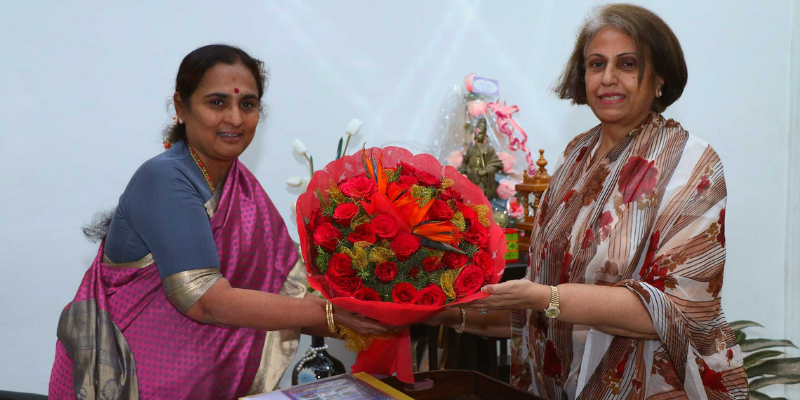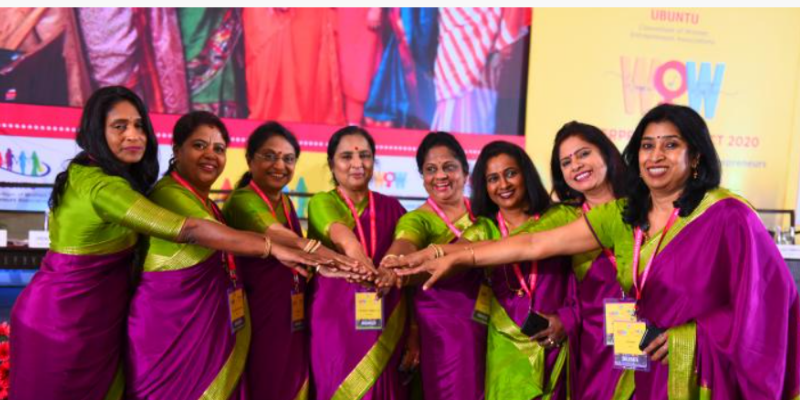In 1986, when civil services officer K Ratna Prabha was posted in Chikmagalur as a Special Deputy Commissioner and Project Director of District Rural Development Society, a conversation with a local schoolteacher became the cornerstone of her journey as a civil servant and a leader.
The kind schoolteacher, now 80, had told Ratna that although very few women get into service, they work just as well as their male counterparts, but the women leave without creating any impact for other women. These words resonated with Ratna, so much so that she left a trail of impact behind her.
A graduate of the 1981 Karnataka cadre, Ratna has shattered several glass ceilings as the first woman to assume many of the roles she did. In addition to those, she took it upon herself to empower women through entrepreneurship because “that was an area that nobody really looked at.”
Close to four decades later, her work continues in the form of , which is a consortium of Women Entrepreneurs’ Association.
“That teacher’s words really touched my heart. Yes, being a woman, one should do something for women because there is no point in women officers getting into the service otherwise,” she tells Shradha Sharma, Founder and CEO, YourStory, in a freewheeling chat.

K Ratna Prabha with Pramoda Devi, the Maharani of Mysuru
Ubuntu: in happiness and in sorrow
During Ratna’s role as the Additional Chief Secretary of Department of Commerce & Industries, Government of Karnataka, between 2014 and 2017, she was part of the committee drafting the industrial policy.
“When I looked at the previous policies, I found that there was nothing specific for women. Women were clubbed with ex-serviceman, NRIs, the differently-abled and other groups, but I felt a need for a separate chapter or policy for women,” she shares.
In 2015, to understand their needs and problems, Ratna held a meeting with about 200 women entrepreneurs during INVEST Karnataka. She then drafted a policy for women entrepreneurs, working closely with women associations, and eventually built a separate Women's Park in three to four districts in Karnataka, and facilitated incentives, concessions, and exhibitions wherever possible.
They formed a WhatsApp group to continue the discussion and that is when one of the members suggested the name Ubuntu, an African word which means humanity to others.
“It says how can I be happy if you are not happy. My happiness lies in your happiness, and I can be happy only if I share my joy and your sorrow. That is how we brought all the associations together and made sure that all others will attend when an association is organising an event. We were large in numbers, and could show our strength and attract the attention of the governments, chief ministers, and industry ministers,” she says.
A year after Ratna retired as the Chief Secretary of Government of Karnataka, Ubuntu was registered as an NGO on International Women’s Day 2019 with eight founding members. Today, it is a consortium with 24 women’s associations indirectly reaching out to 12,000 women entrepreneurs from across Andhra Pradesh, Goa, Telangana, Madhya Pradesh, Mumbai, Delhi, and Tamil Nadu.
Uma Reddy, a founding member of Ubuntu, says, “It is so difficult to get associations together because they are all in competition with each other instead of being competitive for each other. Ratna's role made it possible because she had a very objective way of working with every association.”
Uma further emphasised that Ubuntu’s policies and initiatives were designed to support every association to grow in strength and not compete with them, as it did not take any direct membership of women entrepreneurs.
“Two years from now, I am looking at covering the entire country and getting most women associations on one platform. It would be wonderful for Ubuntu to grow from 25 to 100 associations, and even go international as well,” Ubuntu’s treasurer Latha Girish adds.
Support during COVID-19
To help women entrepreneurs stay afloat and navigate newer challenges during the pandemic, Ubuntu focused on lending all kinds of help online, and reaching out to all parts of the country in a simple and effective way.
It tied up with the United Nations Development Programme (UNDP), and organised several online networking programmes and the Mahila Udaga Sahaya Wahini as a helpline to address their concerns. In June, it launched various life skills training programmes, especially for those in Tier II cities, on managing home and themselves.
In partnership with the UN, the women entrepreneurs were suitably trained and given a platform to share about their businesses with Southeast Asian countries. With Global Alliance for Mass Entrepreneurship (GAME), it trained select women entrepreneurs whose businesses were clocking lakhs in revenue to scale the growth to crores with a success rate of nearly 60 percent despite COVID-19.
Ubuntu now plans on developing an ecommerce marketplace where women entrepreneurs can display their products and sell online.
Shaping women entrepreneurs’ role in the country

Jyoti Balakrishna, secretary at the consortium, firmly believes change begins at home, and says sons and daughters should be raised as equals.
“The universal problem is that women don multiple caps and responsibilities that cannot be compromised or given up. This warrants more support from the government and leaders to lead women entrepreneurs into the mainstream,” she adds.
“All women have similar problems at home, in society, and at the workplace. They have more problems than men because they have to look after their households, tend to the chores, children, the business, and finally, their image in the society,” adds Raji Rajasekhar, a founding member of Ubuntu Consortium and director of FON-ESS India.
Speaking from her experience that runs into decades, Ratna notes that anything to do with women is not given much importance in the government.
“Whenever we talk about beneficiaries, the officers immediately select men and rarely do they think of doing something for women. This mindset is because most officials are men.”

The founding members of Ubunto consortium
In various functions and annual budget meetings, women enjoy a mere token representation. “This is the place for women at present in any part of the country. And I am looking at a time when no function, event, or government can survive and succeed without women. It is very difficult, but we will try to reach that level,” Ratna says with conviction.
She cites self-made billionaire entrepreneur Kiran Mazumdar Shaw as an example, and says the goal is an impact where each association is able to support and bring forth “10 to 20 Kiran Mazumdar Shaws” each.
“People always say that a woman is a woman's worst enemy. With Ubuntu, at least they understand that women are lifting each other up,” Raji concludes.
Edited by Anju Narayanan
Link : https://yourstory.com/2021/07/ubuntu-consortium-women-entrepreneurs-ratnaprabha
Author :- Tenzin Norzom ( )
July 23, 2021 at 11:59AM
YourStory


